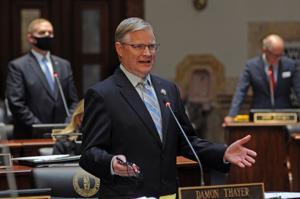Pari-mutuel wagering tax focus of new Kentucky committee

(The Center Square) – Kentucky Senate Majority Floor Leader Damon Thayer and state Rep. Adam Koenig have been named as the co-chairs of a committee that will examine the tax structure on pari-mutuel wagering.
The committee was established earlier this year as the General Assembly passed legislation that allows the Kentucky Horse Racing Commission to approve and regulate historical horse racing (HHR).
HHR machines look like slot machines but instead of a random number generator, the machines use wagers on previously run races to determine winners.
During the debate on the legislation, questions were raised about the tax rate on the machines. The state’s general fund receives 1.5% of the handle – or total money wagered – after funding for thoroughbred and standardbred horse breeding development is subtracted.
Thayer, R-Georgetown, previously worked for the Breeders’ Cup and the National Thoroughbred Racing Association. Koenig, R-Erlanger, chairs the House Committee on Licensing, Occupations and Administrative Regulations, which deals with matters related to racing.
The Kentucky Equine Education Project, which promotes the horse industry in the state, said in a statement it’s prepared to work with the committee to ensure the tax structure is fair to the state and an industry that’s responsible for 60,000 direct and indirect jobs statewide.
Critics claim the state is not getting enough revenue from the gaming machines in return for letting tracks offer them at their facilities.
Jason Bailey, the executive director for the Kentucky Center for Economic Policy, told The Center Square in an email Wednesday he hopes lawmakers raise a tax rate he called “egregiously” low.
According to data from the Kentucky Horse Racing Commission, $531.8 million was bet at HHR parlors across the state in April. Of that, the tracks received $46.1 million and the state general fund received $3.7 million.
That works out to about 8% of the track’s revenue. When the $4.3 million in breeding development funds are added, the total equates to 17.3%.
By comparison, the Indiana Gaming Commission reported wagering taxes of $62.9 million off revenues of $202.9 million from the state’s 10 casinos and two racinos.
Indiana taxes casinos and racinos on a graduated scale. Most casinos start with a 15% rate for adjusted gross revenues of less than $25 million and are capped at 40% for revenues higher than $600 million.
Racinos are taxed at 25% for revenues less than $100 million, 30% for the next $100 million and 35% for revenues exceeding $200 million. Racinos also deduct 12% from their gross revenues, with that money going toward breeding development funds.
Unlike Kentucky’s HHR parlors, which are located at tracks and satellite facilities, Indiana’s casinos and racinos also offer table games and slots. However, slots still generate about 85% of the revenue.
Republicans, who hold majorities in both chambers, hold eight of the 10 seats on the committee. Other members are state Sens. Julie Raque Adams, R-Louisville; Denise Harper Angel, D-Louisville; Christian McDaniel, R-Taylor Mill; and Stephen West, R-Paris. Other House members include state Reps. Jonathan Dixon, R-Corydon; Al Gentry, D-Louisville; Matthew Koch, R-Paris; and Jason Petrie, R-Elkton.
Disclaimer: This content is distributed by The Center Square
